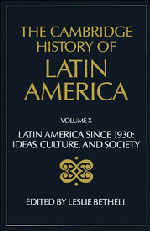Book contents
- Frontmatter
- 1 The multiverse of Latin American identity, c. 1920–c. 1970
- 2 Latin American narrative since c. 1920
- 3 Latin American poetry, c. 1920–1950
- 4 Latin American poetry since 1950
- 5 Indigenous literatures and cultures in twentieth-century Latin America
- 6 Latin American music, c. 1920—c. 1980
- 7 Latin American architecture, c. 1920–c. 1980
- 8 Latin American art since c. 1920
- 9 Latin American cinema
- 10 Latin American broadcasting
- Bibliographical essays
- References
1 - The multiverse of Latin American identity, c. 1920–c. 1970
Published online by Cambridge University Press: 28 March 2008
- Frontmatter
- 1 The multiverse of Latin American identity, c. 1920–c. 1970
- 2 Latin American narrative since c. 1920
- 3 Latin American poetry, c. 1920–1950
- 4 Latin American poetry since 1950
- 5 Indigenous literatures and cultures in twentieth-century Latin America
- 6 Latin American music, c. 1920—c. 1980
- 7 Latin American architecture, c. 1920–c. 1980
- 8 Latin American art since c. 1920
- 9 Latin American cinema
- 10 Latin American broadcasting
- Bibliographical essays
- References
Summary
introduction: contexts for identity
In the twentieth century the term ‘identity’ has been heavily worked to denote linkage between culture and society. Although the word keeps losing its edge, new generations periodically resharpen it. The term is so loose that one can apply it to anything from mankind at large to a single person seeking self-knowledge via psychotherapy. Artists, poets, historians, anthropologists, philosophers and politicians entertain versions of identity even when not consciously in quest of it or not confident of the term’s utility. This chapter will consider identity primarily with reference to national societies, to aggregations of national societies (Latin America), and to sub-national societies or groups. Two distinctions are important. First, identity, which implies linkage to or manifestation of collective conscience, is not the same as ‘reality’, a word widely used in Latin America to mean historical, socio-geographic factors that might be recognized as creating a circumambient reality. Both terms fluctuate between a descriptive, empirical meaning and a prospective or promissory one. ‘Reality’ may signify what ‘really’ exists or else, in a quasi-Hegelian sense, a ‘higher’ reality to be ascertained as a sine qua non for pursuit of the historic vocation of a people or nation (e.g., essays of interpretation of the ‘Peruvian reality’). Identity is not ‘national character’ as diagnosed by detached socio-psychiatry but collective awareness of historic vocation. Reality starts with environment, identity with tacit self-recognition.
- Type
- Chapter
- Information
- The Cambridge History of Latin America , pp. 1 - 128Publisher: Cambridge University PressPrint publication year: 1995

